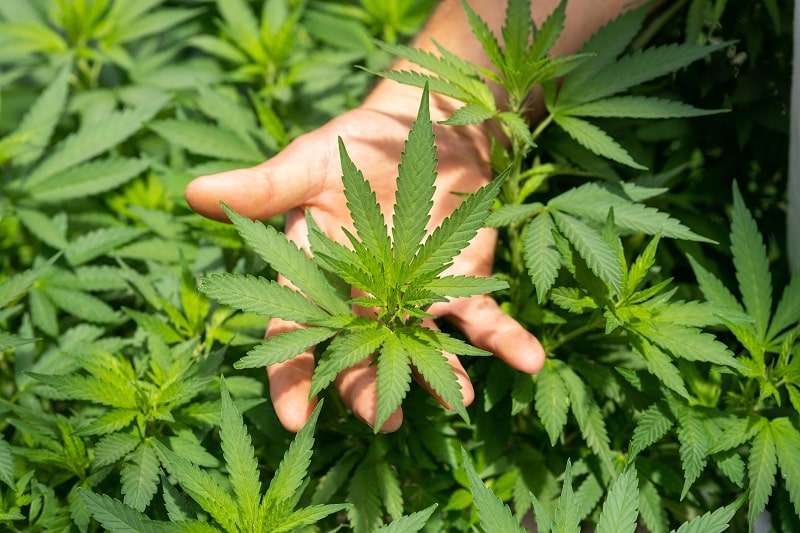CBG vs CBD: Differences and Therapeutic Benefits
While both CBG and CBD are derived from the cannabis plant, they present distinct characteristics and potential benefits.
This article tackles the differences between CBG and CBD and explores their unique properties, potential health benefits, and legality.
CBG vs CBD: What is the Difference
The cannabis plant hosts over 100 compounds. The most notable are Cannabigerol (CBG) and Cannabidiol (CBD).
Although they come from the same plant, these two compounds have distinct characteristics. In a CBG vs CBD comparison, CBG is commonly referred to as the “mother” or “stem cell” of cannabinoids, as it is the precursor from which all other cannabinoids are synthesized.
On the other hand, CBD is a derivative of these processes, with a different molecular structure and diverse effects.
What is CBG?
CBG stands for Cannabigerol, a less prevalent but highly potent compound found in cannabis. It is the parent molecule from which other cannabinoids form, thus the tag “stem cell” cannabinoid. The question “What is CBG?” is expected in a cannabis dispensary, as it is less well-known than CBD.
What is CBD?
CBD, or Cannabidiol, is one of the most well-known and widely studied cannabinoids. It is non-psychoactive, which means it does not produce the “high” associated with cannabis. CBD is celebrated for its potential therapeutic benefits, particularly in managing symptoms of various conditions such as anxiety, insomnia, and chronic pain.
CBG vs CBD: Health Benefits
When comparing CBG vs CBD health benefits, both have shown promise. Research suggests CBD may relieve pain, inflammation, anxiety, and other conditions. Conversely, preliminary studies suggest CBG could combat inflammation, pain, and nausea. It may also have neuroprotective properties. It’s worth noting that while both cannabinoids show potential, more extensive human studies are needed to understand their effects and potential therapeutic benefits fully.
CBG Benefits
Research on CBG is still in its infancy compared to CBD. However, preliminary studies have started to reveal various potential benefits of CBG. Here are some of the possible advantages that CBG might offer:
- Anti-Inflammatory: CBG has shown the potential to reduce inflammation, particularly in conditions like inflammatory bowel disease.
- Neuroprotective Properties: Early studies suggest that CBG may have neuroprotective effects, which could be beneficial in conditions such as Parkinson’s disease, Alzheimer’s disease, and other neurodegenerative conditions.
- Glaucoma Treatment: CBG may help treat glaucoma by reducing intraocular pressure.
- Cancer-fighting Properties: Some studies suggest that CBG may potentially inhibit the growth of certain types of cancer cells.
- Anti-Nausea: CBG could effectively reduce nausea and increase appetite, making it a possible aid for patients undergoing treatments like chemotherapy.
- Antibacterial Properties: CBG is effective against certain strains of antibiotic-resistant bacteria, highlighting its potential as an antibacterial agent.
Remember, these benefits are based on early research, and more studies are needed to substantiate these claims. Always consult with a healthcare provider before incorporating CBG into your wellness routine.
What is CBD Good For
Various types of CBD have been extensively studied for their potential health benefits. It is one of the most well-known cannabinoids due to its widespread use and myriad therapeutic applications. Here are some of the primary potential benefits of CBD:
- Pain Relief: CBD may offer natural relief for various types of pain, from chronic pain to muscle spasms and arthritis-related discomfort.
- Anti-Inflammatory: CBD has shown potential as an anti-inflammatory agent, which could help manage inflammation-related conditions.
- Anxiety and Stress Reduction: Numerous studies suggest that CBD could help manage anxiety and stress levels, contributing to improved mental health.
- Sleep Aid: By addressing anxiety and pain, CBD may help individuals struggling with insomnia or other sleep disorders achieve better sleep quality.
- Epilepsy and Seizure Disorders: CBD has been recognized for its potential to reduce the frequency of seizures in conditions such as epilepsy. A CBD-based drug, Epidiolex, has been FDA-approved for this purpose.
- Neuroprotective Properties: Preliminary research suggests CBD could have neuroprotective properties, possibly assisting in conditions such as Alzheimer’s and Parkinson’s.
- Cardiovascular Health: Early research indicates that CBD may contribute to heart health by reducing blood pressure and preventing heart damage.
As with any supplement or medication, it’s crucial to consult a healthcare professional before starting a CBD regimen. While CBD is generally considered safe, individual reactions can vary, and it can interact with certain medications.
Cannabinoid Structure of CBD and CBG
The cannabinoid structures of CBD and CBG are distinct in their molecular formation. Both belong to a class of molecules called cannabinoids and share a similar chemical formula but have a different arrangement of atoms. This difference in structure is the reason for the unique CBD and CBG benefits.
CBG Products
CBG products are less prevalent than CBD offerings, but the range is growing. From CBG oil and capsules to creams and edibles, there is an expanding choice for consumers interested in exploring this lesser-known cannabinoid. Like CBD, buying from a trusted source ensures product quality and efficacy.
What’s The Difference Between CBG Oil and CBD Oil?
The main difference between CBG oil and CBD oil lies in the cannabinoid content. CBG oil contains high concentrations of CBG, whereas CBD oil is rich in CBD. Given their unique potential benefits and effects, these variations lead to different user experiences.
Are CBD and CBG Both Legal?
Legally speaking, both CBD and CBG are generally permitted in many places, including the United States, as long as they’re derived from hemp and contain less than 0.3% THC. However, cannabis laws vary by location, so checking local regulations before purchasing is essential.
Right Dosage of CBG
Determining the proper dosage of CBG isn’t a one-size-fits-all matter. It depends on various factors, including individual body chemistry, the particular ailment being treated, and the specific CBG cannabinoid product being used. It’s advised to start with a low dose and gradually increase until the desired effects are achieved.
For personalized advice on dosage, consider contacting health professionals or contact us for more information.
CBG and CBD offer potential health and wellness benefits. As research continues to unfold, our understanding of these potent cannabinoids will grow.

Ian Baker handles content marketing at Happy Leaf Portland. There are 5 years that he is deeply involved in the cannabis field. He had 3 years of experience as a Budtender and thanks to his desire to achieve more, he has a career move. Currently he works as a content manager.










